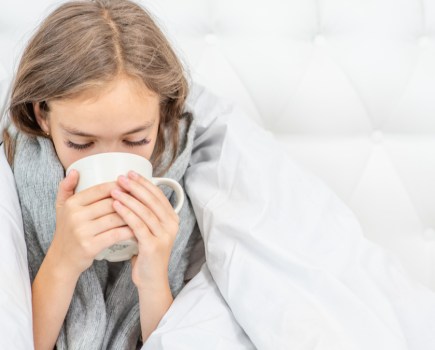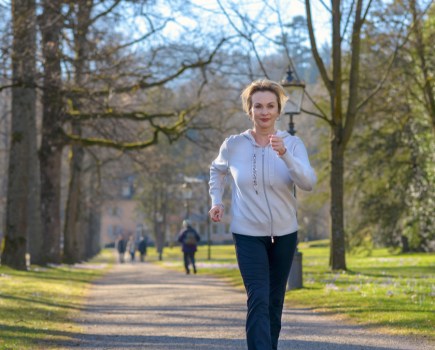What happens to your body and mind during menopause? Here, we take a look at how to know if you are menopausal, the symptoms to look out for, and what you can do to make things easier.
Menopause is a natural phase of life when your periods stop. Everyone’s experience of it is different.
While some may seem to breeze through it, most will experience one of the many symptoms that come with menopause, from hot flushes and anxiety to aches and pains, and a plummeting libido.
In the past the menopause was a time of life that was not talked about much, but today it is discussed and written about far more. That’s great, because the more information you have about it, the easier it is to find the right treatments, discover the lifestyle changes that will make you feel better and to realise that you are not alone.
With the right information, you can be your best in body and mind throughout this important time of life.
Read on to find out more about menopause. However, this is no substitute for medical advice, so if you think you are having menopause-related symptoms, don’t suffer in silence, see your GP to ascertain if you are menopausal, talk through the possible treatments and find the right solutions for you.
What is menopause?
Simply put, menopause is when you stop menstruating. The average age for this stage of life to happen is 51 with the age range usually being between 45 and 55, according to the NHS website. However, it can happen at an earlier age. If it happens before you’re 40, this is called premature menopause.
For some, menstruation stops suddenly, but it is not always an abrupt and obvious moment. It can be that your periods become intermittent before stopping altogether and this can take months or years.
This phase leading up to the final period is known as perimenopause. Once you’ve been period-free for a year, then you know that you have had the menopause, after that you are post-menopausal.
What causes menopause?
Menopause is a natural part of getting older. It’s when your ovaries stop releasing eggs, menstruation stops and your ability to get pregnant ends. When people talk about ‘going through the menopause’ what they are often referring to is actually the perimenopause, which is the lead-up to that final period. During this time your oestrogen levels can fluctuate and you may experience intermittent periods.
Early menopause can happen if your ovaries stop making hormones at the usual levels. This is sometimes referred to as premature ovarian failure. This can be caused by an autoimmune disease or chromosome abnormalities, but often the cause is not known.
Cancer treatments such as radiotherapy and chemotherapy can also be a cause, but this depends on your age, the exact type of treatment involved and which part of your body receives the treatment. If you need surgery to remove your ovaries this will also mean you go through premature menopause.
What are the symptoms of menopause?
Menopause symptoms can be physical and emotional. These are some of the main ones that women experience, although there are others:
Physical symptoms of menopause include
- Hot flush. This is where you suddenly feel an overwhelming heat that spreads through your body.
- Night sweats. These can leave you and your bedding drenched.
- Difficulty sleeping. This can be caused by other menopausal symptoms.
- Pain and stiffness in your joints and muscles.
- Sexual problems. Hormonal changes can cause the vagina to be dry and to feel more fragile, so this can make having sex uncomfortable. The hormonal changes can also cause a loss of sex drive.
Emotional symptoms of menopause
Menopause can be a difficult emotional time both for you and those around you because of the way it makes you feel. You may experience some or all of the following:
- Mood swings
- Irritability
- Low mood
- Anxiety
- Brain fog
A kind of symptom domino effect can happen, where one symptom leads to another, so night sweats lead to lack of sleep and that has an impact on mood and concentration.
How is menopause diagnosed?
Being without periods for a year is the ultimate indication that you have had the menopause. But as this is a retrospective discovery you may want more of an indication while you are actually going through the process. Don’t assume all your symptoms are menopause-related though, it’s worth getting them checked out in case the cause lies elsewhere. Your doctor may do a blood test that will give an indication of where you are on the menopause journey, but this is usually only done if you aged under 45.
How is menopause treated?
There are many possibilities for treating menopause, from Hormone Replacement Therapy (HRT) to natural approaches including lifestyle changes. There are also specific treatments for particular symptoms and there are talking therapies that can help with the emotional side.
Medication
HRT works by replacing the hormones that have taken a dip. Many of the symptoms of menopause can be eased by HRT including hot flushes, night sweats, mood swings, vaginal dryness and reduced libido. Osteoporosis, which is more common after you’ve gone through menopause, can be helped by HRT. They can be given via skin patches, tablets and implants. There are some potential risks to taking HRT. There is an increased breast cancer risk for those who take it for more than a year, compared to those who have never taken it. This doesn’t relate to taking vaginal oestrogen, however. To put it in context the NHS website says that for women in their 40s and 50s taking HRT for five years there would be 1 extra case for every 200 women taking oestrogen-only HRT, one extra case for every 70 women on cyclical HRT, and one extra case for every 50 women on continuous HRT. It is a complicated subject, so the risks are certainly something to talk through and weigh up with your doctor in the light of your own medical history and preferences.
Lifestyle changes
Whether or not you take HRT, a healthy lifestyle will help you to manage menopause symptoms. Taking regular exercise can help in a number of ways. It can improve your mood and your sleep, help you manage your weight, and increase your strength and fitness. It is can also help prevent osteoporosis, which is a risk as you get older.
A balanced diet will help you maintain good health, which will help your body weather the changes it is going through. For specific symptoms such as hot flushes, avoid foods that you know trigger an episode. This may include alcohol or caffeine or spicy food.
Therapy
If anxiety and low mood or mood swings caused by menopause are affecting you it is important to get help. Don’t just suffer in silence and think that these things are inevitable. Cognitive Behavioural Therapy (CBT) may help. This is a therapy that encourages you to break down problems into smaller parts and to challenge negative thoughts and assumptions.







